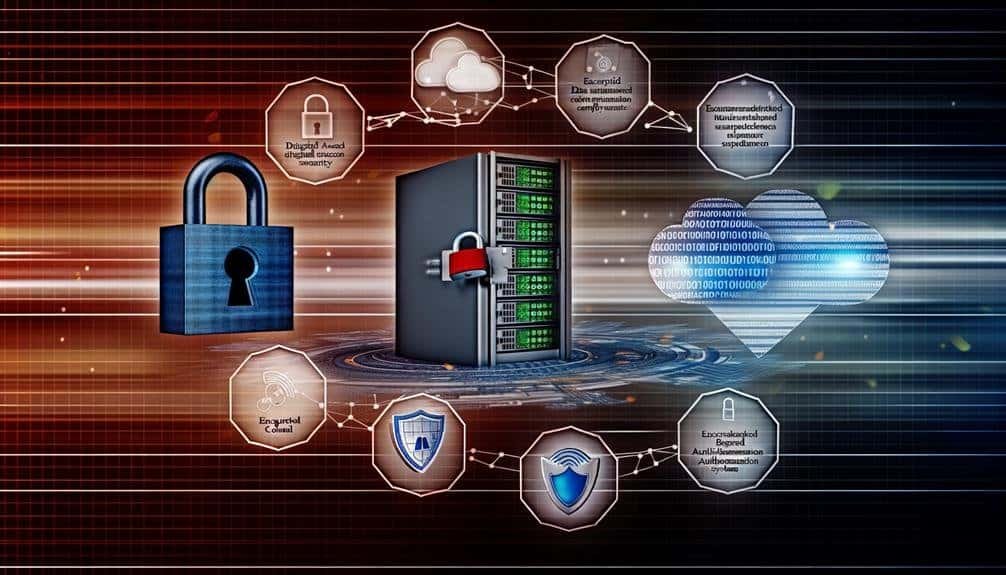What Is CJIS Compliance?
Are you aware of the importance of CJIS compliance?
As a professional in the field, you understand the need for adhering to strict regulations when it comes to handling sensitive criminal justice information.
But what exactly does CJIS compliance entail?
In this discussion, we will dive into the basics of CJIS compliance, explore the key requirements, and highlight the benefits of achieving compliance.
So, let's uncover the intricacies of CJIS compliance and discover why it is crucial for your organization.
Key Takeaways
- CJIS compliance is essential for organizations handling criminal justice information, as it ensures adherence to necessary security measures.
- Training employees on CJIS compliance is crucial, as it covers areas such as physical security, access controls, data encryption, and incident response procedures.
- Maintaining CJIS compliance requires implementing robust cybersecurity measures, strict access controls, regular system assessments, and encryption of data in transit and at rest.
- Achieving CJIS compliance offers benefits such as enhanced data security, improved operational efficiency, access to valuable resources, mitigation of legal and financial risks, and maintaining public trust.
The Basics of CJIS Compliance
Understanding the essential components of CJIS compliance is crucial for any organization that handles criminal justice information. To ensure compliance, organizations must adhere to a CJIS compliance checklist and provide CJIS compliance training to their employees.
The CJIS compliance checklist outlines the requirements and best practices that organizations need to follow to protect sensitive criminal justice information. It covers areas such as physical security, access controls, data encryption, and incident response procedures. By implementing these measures, organizations can mitigate the risk of unauthorized access or disclosure of criminal justice information.
Additionally, providing CJIS compliance training to employees is essential to ensure they understand their responsibilities and the importance of safeguarding this sensitive data. Compliance training should cover topics such as data handling procedures, password security, and reporting security incidents promptly.
Understanding the CJIS Security Policy
To gain a comprehensive understanding of CJIS compliance, it's imperative to familiarize yourself with the intricacies of the CJIS Security Policy.
The CJIS Security Policy is a set of guidelines and requirements established by the Criminal Justice Information Services (CJIS) Division of the FBI. It outlines the necessary security measures that organizations handling criminal justice information must implement to ensure the protection of sensitive data.
The policy encompasses various areas such as physical security, access control, incident response, and encryption. It emphasizes the importance of data protection and the need to prevent unauthorized access, disclosure, alteration, or destruction of criminal justice information.
Adhering to the CJIS Security Policy is crucial to maintaining the integrity and confidentiality of data, and demonstrating compliance with CJIS standards.
Key Requirements for CJIS Compliance
Now let's explore the essential requirements for achieving CJIS compliance.
To ensure CJIS compliance, law enforcement agencies must implement robust cybersecurity measures. These measures include maintaining strict access controls to protect sensitive data from unauthorized access.
Agencies must also regularly assess and audit their systems to identify vulnerabilities and address them promptly. Encryption of data both in transit and at rest is crucial to safeguarding information.
Additionally, agencies must have comprehensive incident response plans in place to quickly detect and respond to any security breaches. Training and awareness programs for personnel are essential to ensure compliance with CJIS security policies and procedures.
Benefits of Achieving CJIS Compliance
Achieving CJIS compliance offers numerous benefits to law enforcement agencies, enhancing the security and effectiveness of their operations. By ensuring compliance, agencies can safeguard sensitive criminal justice information and maintain the trust of the public.
The benefits of achieving CJIS compliance include:
- Enhanced data security: Compliance measures help protect against data breaches and unauthorized access, ensuring the confidentiality, integrity, and availability of criminal justice information.
- Improved operational efficiency: Compliance promotes standardized processes and best practices, streamlining operations and reducing the risk of errors.
- Access to valuable resources: Compliance allows agencies to access CJIS systems, databases, and tools, enabling collaboration and information sharing among law enforcement agencies.
- Mitigation of legal and financial risks: Complying with CJIS requirements helps agencies avoid costly penalties, lawsuits, and reputational damage.
To achieve CJIS compliance efficiently, agencies must follow strict guidelines, such as implementing robust security controls, conducting regular audits, and providing training to personnel. By prioritizing compliance, agencies can reap the benefits of enhanced security, efficiency, and collaboration in their operations.
Ensuring CJIS Compliance: Best Practices and Tips
By implementing best practices and following key tips, law enforcement agencies can effectively ensure CJIS compliance and maintain the security and integrity of their criminal justice information.
One of the most important aspects of ensuring CJIS compliance is data protection. This involves implementing strong access controls, encryption measures, and regular backups to safeguard sensitive information from unauthorized access or loss.
Additionally, conducting regular audits is crucial in the audit process. This helps identify any vulnerabilities or non-compliance issues and allows for timely corrective actions.
It's also essential to train and educate employees on CJIS compliance requirements and best practices to ensure they understand their responsibilities in protecting criminal justice information.
Conclusion
Congratulations on achieving CJIS compliance!
By adhering to the CJIS Security Policy and meeting its key requirements, you have ensured the confidentiality, integrity, and availability of criminal justice information.
This compliance not only enhances data security but also fosters trust among law enforcement agencies and the public.
By implementing best practices and following these guidelines, you have successfully safeguarded sensitive information and taken a significant step towards maintaining a secure and reliable criminal justice system.
Kudos for your commitment to CJIS compliance!







